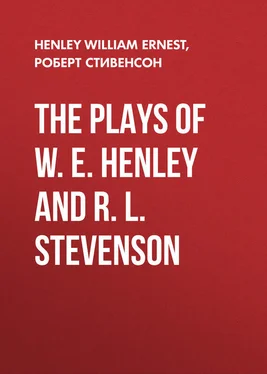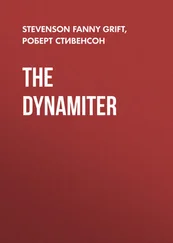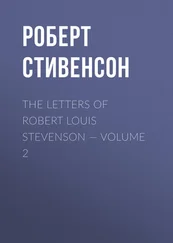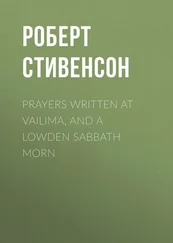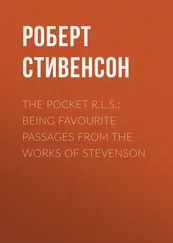Роберт Стивенсон - The Plays of W. E. Henley and R. L. Stevenson
Здесь есть возможность читать онлайн «Роберт Стивенсон - The Plays of W. E. Henley and R. L. Stevenson» — ознакомительный отрывок электронной книги совершенно бесплатно, а после прочтения отрывка купить полную версию. В некоторых случаях можно слушать аудио, скачать через торрент в формате fb2 и присутствует краткое содержание. Жанр: literature_19, foreign_antique, foreign_prose, foreign_dramaturgy, на английском языке. Описание произведения, (предисловие) а так же отзывы посетителей доступны на портале библиотеки ЛибКат.
- Название:The Plays of W. E. Henley and R. L. Stevenson
- Автор:
- Жанр:
- Год:неизвестен
- ISBN:нет данных
- Рейтинг книги:5 / 5. Голосов: 1
-
Избранное:Добавить в избранное
- Отзывы:
-
Ваша оценка:
- 100
- 1
- 2
- 3
- 4
- 5
The Plays of W. E. Henley and R. L. Stevenson: краткое содержание, описание и аннотация
Предлагаем к чтению аннотацию, описание, краткое содержание или предисловие (зависит от того, что написал сам автор книги «The Plays of W. E. Henley and R. L. Stevenson»). Если вы не нашли необходимую информацию о книге — напишите в комментариях, мы постараемся отыскать её.
The Plays of W. E. Henley and R. L. Stevenson — читать онлайн ознакомительный отрывок
Ниже представлен текст книги, разбитый по страницам. Система сохранения места последней прочитанной страницы, позволяет с удобством читать онлайн бесплатно книгу «The Plays of W. E. Henley and R. L. Stevenson», без необходимости каждый раз заново искать на чём Вы остановились. Поставьте закладку, и сможете в любой момент перейти на страницу, на которой закончили чтение.
Интервал:
Закладка:
William Ernest Henley
The Plays of W. E. Henley and R. L. Stevenson
DEACON BRODIE OR THE DOUBLE LIFE
A MELODRAMA IN FIVE ACTS AND EIGHT TABLEAUX
PERSONS REPRESENTED
William Brodie, Deacon of the Wrights, Housebreaker and Master Carpenter.
Old Brodie, the Deacon’s Father.
William Lawson, Procurator-Fiscal, the Deacon’s Uncle.
Andrew Ainslie, Humphrey Moore, George Smith, Robbers in the Deacon’s gang.
Captain Rivers, an English Highwayman.
Hunt, a Bow Street Runner.
A Doctor.
Walter Leslie.
Mary Brodie, the Deacon’s Sister.
Jean Watt, the Deacon’s Mistress.
Vagabonds, Officers of the Watch, Men-servants.
The Scene is laid in Edinburgh. The Time is towards the close of the Eighteenth Century.
The Action, some fifty hours long, begins at eight p.m. on Saturday and ends before midnight on Monday.
Note. — Passages suggested for omission in representation are enclosed in square brackets , thus [ ].
SYNOPSIS OF ACTS AND TABLEAUX
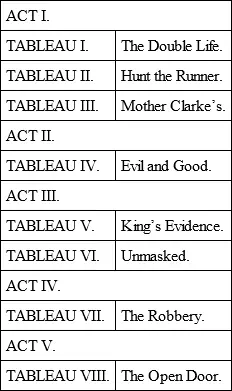
LONDON: PRINCE’S THEATRE
2 d July 1884
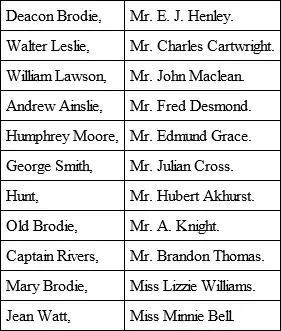
MONTREAL
26 th September 1887
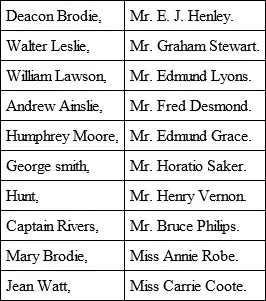
ACT I
TABLEAU I.
The Double Life
The Stage represents a room in the Deacon’s house , furnished partly as a sitting- , partly as a bed-room , in the style of an easy burgess of about 1780. C. , a door ; L. C. , a second and smaller door ; R. C. , practicable window ; L. , alcove , supposed to contain bed ; at the back , a clothes-press and a corner cupboard containing bottles , etc. Mary Brodie at needlework ; Old Brodie, a paralytic , in wheeled chair , at the fireside , L.
Leslie. May I come in, Mary?
Mary. Why not?
Leslie. I scarce knew where to find you.
Mary. The dad and I must have a corner, must we not? So when my brother’s friends are in the parlour he allows us to sit in his room. ’Tis a great favour, I can tell you; the place is sacred.
Leslie. Are you sure that ‘sacred’ is strong enough?
Mary. You are satirical!
Leslie. I? And with regard to the Deacon? Believe me, I am not so ill-advised. You have trained me well, and I feel by him as solemnly as a true-born Brodie.
Mary. And now you are impertinent! Do you mean to go any further? We are a fighting race, we Brodies. Oh, you may laugh, sir! But ’tis no child’s play to jest us on our Deacon, or, for that matter, on our Deacon’s chamber either. It was his father’s before him: he works in it by day and sleeps in it by night; and scarce anything it contains but is the labour of his hands. Do you see this table, Walter? He made it while he was yet a ’prentice. I remember how I used to sit and watch him at his work. It would be grand, I thought, to be able to do as he did, and handle edge-tools without cutting my fingers, and getting my ears pulled for a meddlesome minx! He used to give me his mallet to keep and his nails to hold; and didn’t I fly when he called for them! and wasn’t I proud to be ordered about with them! And then, you know, there is the tall cabinet yonder; that it was that proved him the first of Edinburgh joiners, and worthy to be their Deacon and their head. And the father’s chair, and the sister’s workbox, and the dear dead mother’s footstool – what are they all but proofs of the Deacon’s skill, and tokens of the Deacon’s care for those about him?
Leslie. I am all penitence. Forgive me this last time, and I promise you I never will again.
Mary. Candidly, now, do you think you deserve forgiveness?
Leslie. Candidly, I do not.
Mary. Then I suppose you must have it. What have you done with Willie and my uncle?
Leslie. I left them talking deeply. The dear old Procurator has not much thought just now for anything but those mysterious burglaries —
Mary. I know! —
Leslie. Still, all of him that is not magistrate and official is politician and citizen; and he has been striving his hardest to undermine the Deacon’s principles, and win the Deacon’s vote and interest.
Mary. They are worth having, are they not?
Leslie. The Procurator seems to think that having them makes the difference between winning and losing.
Mary. Did he say so? You may rely upon it that he knows. There are not many in Edinburgh who can match with our Will.
Leslie. There shall be as many as you please, and not one more.
Mary. How I should like to have heard you! What did uncle say? Did he speak of the Town Council again? Did he tell Will what a wonderful Bailie he would make? O why did you come away?
Leslie. I could not pretend to listen any longer. The election is months off yet; and if it were not – if it were tramping upstairs this moment – drums, flags, cockades, guineas, candidates, and all! – how should I care for it? What are Whig and Tory to me?
Mary. O fie on you! It is for every man to concern himself in the common weal. Mr. Leslie – Leslie of the Craig! – should know that much at least.
Leslie. And be a politician like the Deacon? All in good time, but not now. I hearkened while I could, and when I could no more I slipped out and followed my heart. I hoped I should be welcome.
Mary. I suppose you mean to be unkind.
Leslie. Tit for tat. Did you not ask me why I came away? And is it usual for a young lady to say ‘Mr.’ to the man she means to marry?
Mary. That is for the young lady to decide, sir.
Leslie. And against that judgment there shall be no appeal?
Mary. O, if you mean to argue! —
Leslie. I do not mean to argue. I am content to love and be loved. I think I am the happiest man in the world.
Mary. That is as it should be; for I am the happiest girl.
Leslie. Why not say the happiest wife? I have your word, and you have mine. Is not that enough?
Mary. Have you so soon forgotten? Did I not tell you how it must be as my brother wills? I can do only as he bids me.
Leslie. Then you have not spoken as you promised?
Mary. I have been too happy to speak.
Leslie. I am his friend. Precious as you are, he will trust you to me. He has but to know how I love you, Mary, and how your life is all in your love of me, to give us his blessing with a full heart.
Mary. I am sure of him. It is that which makes my happiness complete. Even to our marriage I should find it hard to say ‘Yes’ when he said ‘No.’
Leslie. Your father is trying to speak. I’ll wager he echoes you.
Mary ( to Old Brodie). My poor dearie! Do you want to say anything to me? No? Is it to Mr. Leslie, then?
Leslie. I am listening, Mr. Brodie.
Mary. What is it, daddie?
Old Brodie. My son – the Deacon – Deacon Brodie – the first at school.
Leslie. I know it, Mr. Brodie. Was I not the last in the same class? ( To Mary.) But he seems to have forgotten us.
Читать дальшеИнтервал:
Закладка:
Похожие книги на «The Plays of W. E. Henley and R. L. Stevenson»
Представляем Вашему вниманию похожие книги на «The Plays of W. E. Henley and R. L. Stevenson» списком для выбора. Мы отобрали схожую по названию и смыслу литературу в надежде предоставить читателям больше вариантов отыскать новые, интересные, ещё непрочитанные произведения.
Обсуждение, отзывы о книге «The Plays of W. E. Henley and R. L. Stevenson» и просто собственные мнения читателей. Оставьте ваши комментарии, напишите, что Вы думаете о произведении, его смысле или главных героях. Укажите что конкретно понравилось, а что нет, и почему Вы так считаете.
